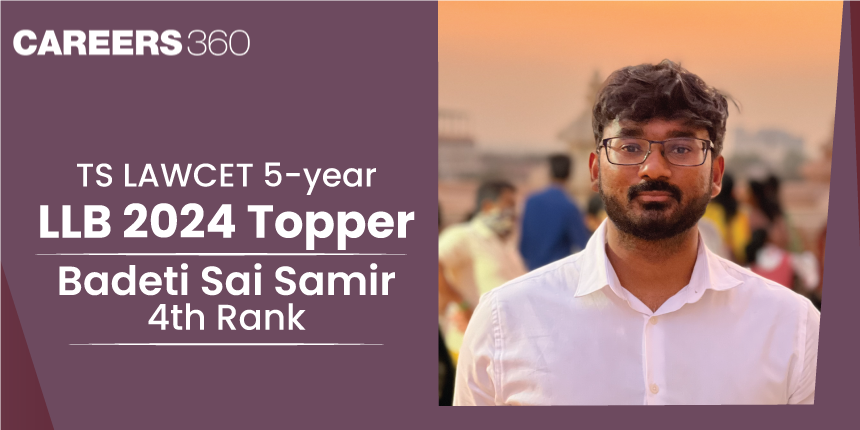TS LAWCET 2024 Topper Badeti Sai Samir (AIR 4):"Company of good lawyers made me choose law”
Meet Badeti Sai Samir who secured 4th rank in the recently concluded TS LAWCET 2024 exam for 5-year LLB with a score of 82 marks. Coming from a family of lawyers, he too chose to pursue law. An aspiring civil servant, Sai Samir has decided to take up law amidst his civil services preparations. Read the full interview here as Samir shares his success story with Careers360.

Q. How did you feel when you saw your rank? Did you expect this rank?
I was extremely happy and delighted to see this rank. I knew I did well but I did not expect to get a rank 4. I am truly humbled and extremely grateful for this rank.
Q. Can you tell us about your educational and family background?
I have done my Engineering from Vasavi College of Engineering and later started preparing for Civil Services. Right now I am still pursuing my preparation for the civil services exam. So at the same time, I thought I’d pursue law. My father is the retired Dean and Principal of Gandhi Medical College and my mother is an Advocate who used to pursue cases in the Labour Courts for Singareni Collaries.
Q. What made you choose to pursue law?
My inspiration came from my grandfather who was a Public Prosecutor for the CBI and also specialised in ACB Cases. Even my mother was a practicing advocate so I was in the company of good lawyers which made me choose this field.
Q. Can you shed light on your section-wise preparation strategy for the TS LAWCET 2024 exam?
For current affairs, it is important to read the newspaper every day and also it would be useful to pick up a monthly current affairs magazine available in the market. For law-related questions, it would be very useful to pick up the past 10-20 years' questions and study each question in detail and at the same time make important notes of that. For aptitude, it would be useful to keep practising questions daily to get used to the exam pattern and pressure.
Q. Which colleges are you targeting for admission?
I am looking at Osmania University only for now.
Q. Did you appear for any other law entrance exams? If yes, how was your performance and which colleges are you targeting?
I appeared for CLAT in December, and I got a rank of 1,500 in that. I was not happy with my performance in CLAT.
Q. What are your future plans?
I plan to pursue law and at the same time continue my preparation for the Civil Services Examination and State Services Exam.
Q. What advice would you like to give to law aspirants preparing for TS LAWCET?
Read the paper every day and take as many mock tests as possible. Get used to taking exams in a pressure situation.
Also check -
Popular Courses and Specializations
Popular Degrees
List of colleges accepting TS LAWCET
Browse Law Colleges by State
Questions related to TS LAWCET
On Question asked by student community
Hey Khursheed:)
Thanks for reaching out!
With a 189 rank in TS LAWCET under BC-E your chances depends on the course .For the 3-year LLB at Osmaina University,the round 1 cutoff was around 210,so your rank is well within range and you still stand a good chance of getting a
Hello,
With 189 rank in TS LAWCET under BC-E category, you have an excellent chance of getting into top law colleges in Telangana. Some of the best options:
- Osmania University, Hyderabad (OU College of Law)
- Kakatiya University, Warangal
- Mahatma Gandhi Law College, Hyderabad
- Padala Rama Reddi Law College, Hyderabad
- Justice
Hello,
Thanks for reaching out!
First of all, congrats on scoring 721 rank in TS LAWCET for 5-Year Law Program. That’s a good rank, especially considering that you belong to the EWS category, which has a separate reservation quota.
Admission to Kakatiya University or its affiliated colleges will depend on
Hey Rida:)
Thanks for reaching out!
With a TS LAWCET Rank of 222 in the BCE category, your chances of getting a free seat in the 5- year LLB at Osmania University are low
•The expected BCE cut-off for 5-year LLB at OU is around rank 100 or below,and your
Hi,
Thanks for reaching out!
If you want to join Osmania University for the 5-year law course after 12th through TS LAWCET,under the BC-D category a good score would be in the range of 80-90 out of 120 .though you could get admission with around 70-75 but 80+ is safer
Start a career in Law. Admissions Open for LLB courses for
Among top 100 Universities Globally in the Times Higher Education (THE) Interdisciplinary Science Rankings 2026
SRM University, Chennai Law UG 2026
ApplyNAAC A++ Accredited | Ranked #11 by NIRF
Chandigarh University Admissions 2026
ApplyNAAC A+ Accredited | Among top 2% Universities Globally (QS World University Rankings 2026)
RV University, Bangalore | Law Admissions 2026
ApplyExcellent curriculum; an impressive range of electives, besides core law courses. Up to 100% merit scholarship on a first-come, first-served basis
UPES Integrated LLB Admissions 2026
ApplyLast Date to Apply: 25th Feb | Ranked #18 amongst Institutions in India by NIRF | Ranked #1 in India for Academic Reputation by QS Rankings | 16 LPA Highest CTC
VIT Chennai Law Admissions 2026
Apply#14 in India by NIRF Ranking | NAAC A++ accredited | Approved by BCI | Scholarships Available
